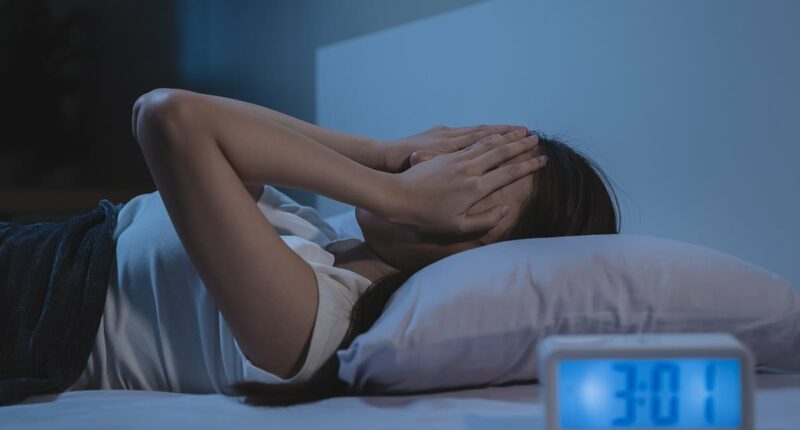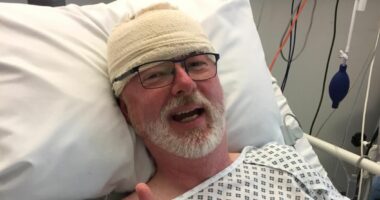Share this @internewscast.com
Individuals who have difficulty falling asleep most nights may face a faster decline in their memory and cognitive abilities as they age, leading to an increased likelihood of developing dementia, a recent study revealed.
Studies have long warned that both the quality and amount of sleep can influence the risk of developing the memory-robbing condition.
According to researchers in the United States, people suffering from chronic insomnia—characterized by trouble sleeping at least three nights a week for a duration of three months—have a 40% greater risk of developing dementia compared to those who do not have this sleep disorder.
This is the equivalent of three-and-a-half years of ageing.
Dr. Diego Carvalho, a neurologist and sleep medicine specialist at the American Academy of Neurology, remarked: ‘Insomnia not only affects your mood the next day but could also negatively impact your long-term brain health.’
He added, ‘We observed a swift decline in cognitive abilities and brain changes, suggesting that chronic insomnia may be an early indicator or even a factor contributing to future cognitive issues.’
The study, which appeared in the journal Neurology, monitored 2,750 adults with no cognitive impairments, with an average age of 70, over a period of just over five years.
Of the cohort, 440 people had been diagnosed with chronic insomnia at the start of the study.

It was discovered that individuals with chronic insomnia were 40% more likely to develop dementia or mild cognitive impairments compared to those without the sleep disorder.
Participants were asked to rate their sleep at the beginning of the study, highlighting whether they had been sleeping more or less than usual over the past two weeks.
Every year participants were invited back to the lab to complete memory and thinking tests.
Brain scans were also carried out to identify any areas where small vessel disease may have damaged brain tissue—known as white matter hyperintensities—and look for build up of amyloid plaque, a protein which has been linked to Alzheimer’s disease.
During the study, 14 per cent of the participants with chronic insomnia developed mild cognitive impairment or dementia, compared to just 10 per cent—or 231 people—who did not have the sleep disorder.
After accounting for confounding factors—including age, blood pressure, use of sleep medications, and a diagnosis of sleep apnea—they concluded that people with insomnia were 40 per cent more likely to develop mild cognitive impairment or dementia.
Insomnia sufferers also had faster declines of tests measuring different thinking skills.
People with an insomnia diagnosis who reported getting less sleep than usual at the start of the study were also more likely to have lower baseline scores, comparable to being four years older than their chronological age.
They also had more damaged brain tissue and amyloid plaque build up, resembling that of people with the APOE ε4 gene, a known genetic risk factor for the memory-robbing disease.
Unsurprisingly, those with the gene were found to be more vulnerable, showing steeper declines in memory and thinking skills.
‘Our results suggest that insomnia may affect the brain in different ways, involving not only amyloid plaques, but also small vessels supplying blood to the brain,’ Dr Carvalho explained.
‘This reinforces the importance of treating chronic insomnia—not just to improve sleep quality but potentially to protect brain health as we age.
‘Our results also add to a growing body of evidence that sleep isn’t just about rest—it’s also about brain resilience.’
However, the researchers noted that at this point their findings are limited because they were relying on insomnia diagnoses from medical records, rather than conducting their own assessments which could better reflect how severe symptoms were.
They also did not take into consideration undiagnosed cases, which could have a confounding effect.
Last year, a study found that around one in six people in the UK suffer from insomnia, yet 65 per cent never seek help for their problem.
Poor sleep has been linked to a number of health problems, including cancer, stroke and neurodegenerative conditions like dementia.
Around 900,000 Brits are currently thought to have the memory-robbing disorder. But University College London scientists estimate this will rise to 1.7million within two decades as people live longer. It marks a 40 per cent uptick on the previous forecast in 2017
Currently around 944,000 people in the UK are thought to be living with dementia, while the figure is expected to be closer to 7million in the US.
Alzheimer’s, the most common form of the memory-robbing condition affects around 6 in 10 people with dementia. There is currently no cure.
But researchers said today a simple blood test to be offered to thousand of adults could detect Alzheimer’s before the cruel disease takes hold.
In a landmark trial, researchers from University College London will uses tests to detect proteins in the blood linked to dementia in an effort to revolutionise NHS diagnostic rates.














